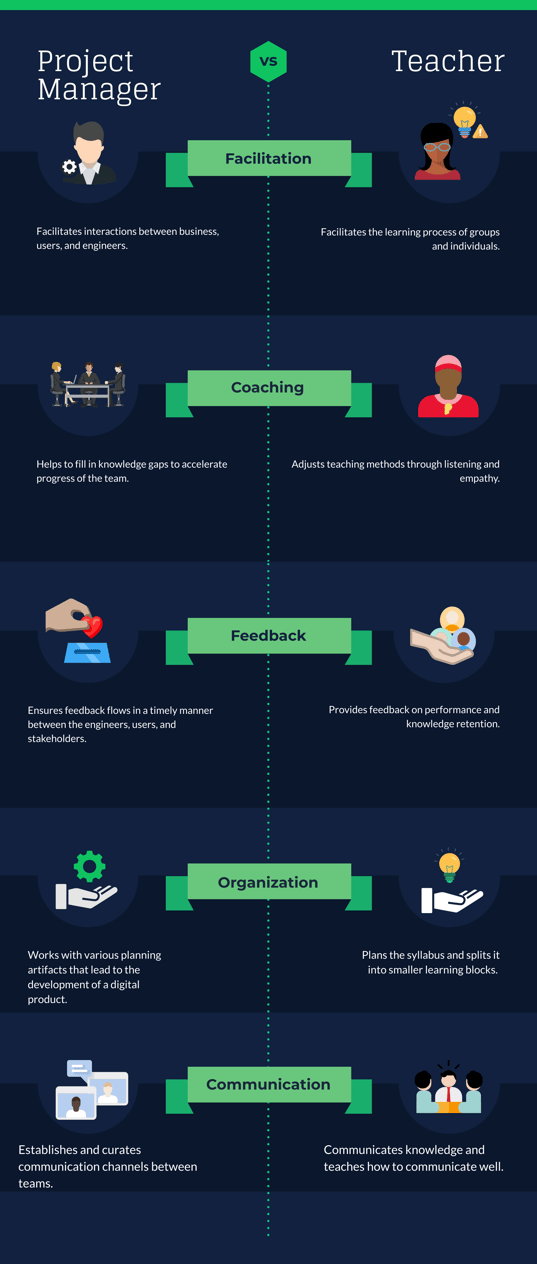How Language Teaching and Project Management Skills Overlap

Having transitioned into software project management from an English teaching background, I met quite a few fellow teachers who took a similar path.
It makes sense - my experience shows that language classroom skills translate into project management very well. Here are the key competencies that come to mind.
Facilitation is a teacher's daily bread
Teachers conduct group and individual classes. These require meticulous preparation, an agenda, timeboxing, and activities tailored to the specific needs of the students.
The format of the classes requires a balance between a repetitive structure that fosters good habits and creative customization that keeps the classes interesting.
Conducting the class itself demands intense focus to stay in tune with the interactions within the group and the progress of the individuals. Very often, something unexpected renders our initial plans obsolete, and we need to improvise to keep the show running. It's rewarding, yet mentally taxing work.
As project managers, we facilitate all sorts of meetings, from daily status checks, through weekly or biweekly planning & review sessions, up to custom workshops whose variety is endless.
Preparing for a meeting is not much different from preparing for a class, although I believe the latter tends to be more time-consuming on average.For teachers transitioning into project management, it can be a nice change of pace.Perhaps the main difference is that as Project Managers, we are more likely to facilitate a meeting where experts work on a problem, rather than act as subject-matter experts ourselves, which is inevitable in most classroom scenarios.
The intensity of preparing and running classes makes for a great training ground for project management work. Thanks to this, teachers tend to be excellent facilitators.
Coaching is an inevitable part of teaching
In the classroom, teachers work with the group as a whole, as well as with individuals within that group. Their needs and personalities vary, and they require different teaching approaches that go beyond what’s happening in the classroom.
Similarly, behind every project there’s a group of people of different backgrounds, skills, needs and preferences. As Project Managers, we create an environment where these individuals can thrive as a group and make progress towards a common goal. Part of that process is filling in knowledge gaps on both the group and individual levels.
We might find ourselves in need of coaching new or junior team members on company and industry best practices, as well as clients who are not familiar with the way the organization works.
Then there’s the psychological support part of the job. Both clients and team members will tend to use their Project Manager as a first point of contact to consult, complain, and vent. Or, simply to be listened to and know their concerns are heard.
Teachers wouldn’t be teachers without strong listening and empathy skills. It’s a part of their vocation, training, and practical experience. As such, they will find the coaching part of project management work intuitive and rewarding.

Feedback & feedforward keep classes and projects going
In a language classroom, teachers provide immediate feedback to pupils, so that they avoid making errors and can express themselves as correctly as possible. At the same time, they need to apportion that feedback well, so as not to overwhelm the students and block them from reaching their main objective, that is communicating in the target language.
This real-time feedback is enhanced through the cycles of homework, tests, and exams.
Feedback goes hand in hand with feed forward. Not only do we want to correct mistakes, but also emphasize the correct way of doing things, what we expect them to speak like, what forms to use, and how to use them.
In a software development project, feedback is key on two fronts.
- First, the teamwork front. Every day of work of a software team costs a lot of money. The output of a team depends on a number of factors, but the quality of teamwork has to be on top. In order to build and maintain that quality with everything it entails — trust, motivation, clear roles and responsibilities — we must give and receive feedback as frequently as possible. More importantly, we need to build an environment where this becomes a norm.
- Second, the product/project front. We need short feedback loops between the project team, business, and users to ensure we’re building the right thing. We need tests to ensure systems work as expected, and we need logs with output showing what went wrong.
Teachers hate delays and are natural-born champions of fostering timely and direct feedback, as well as keeping the ways of providing feedback fresh, accurate, and adjusted to the task at hand. Adapting to the culture of an organization that thrives on feedback will come to aspiring managers with teaching backgrounds easily.
Organizing the teaching process is not much different from organizing a project
The classroom is the frontline where we execute a long-term strategy towards goals expressed in a syllabus. Each lesson is a step that contributes to these objectives. Teachers plan for the school year, the semester, subject blocks, and individual lessons.
This spawns all sorts of information that needs to be tracked, documented, and organized. The more classes and students we have, the bigger the information volume. Teaching demands advanced organizational skills, whether we have them or not — otherwise we wouldn’t survive on the job for very long.
So does project management. Although the pieces of the organizational puzzle might at first seem alien to the uninitiated, it quickly becomes clear that the main differences lie in nomenclature - building a product and a project involves roadmaps, user story maps, backlogs, specifications, and requirements. The essence of what these aim to convey should become familiar to anyone with a language teaching background fast.
In some aspects, teachers might even be better suited to the reality of project management than others. Even though traditionally teachers dealt mostly with physical paperwork, they were among the first adopters of remote ways of working and are likely to have explored digital alternatives and tools long before the pandemic forced the rest of us to work and learn from home.
Teachers transitioning into project management will feel right in their element working on the planning, organization, and documentation of the projects they’re engaged in. The novelty of IT-specific tools is likely to inspire them to take these skills to the next level.
Communication in English - a cherry on top for any teacher turned project manager
Last but not least, proficiency in English is an obvious plus: it makes us look better in front of foreign clients and it enables us to serve as a role-model and aid for the colleagues we work with who might sometimes struggle with one aspect of the language or the other.
With a teaching background, we can identify these individual needs and provide custom help to increase the language competence in the team.
Are you a teacher that is considering a PM career?







